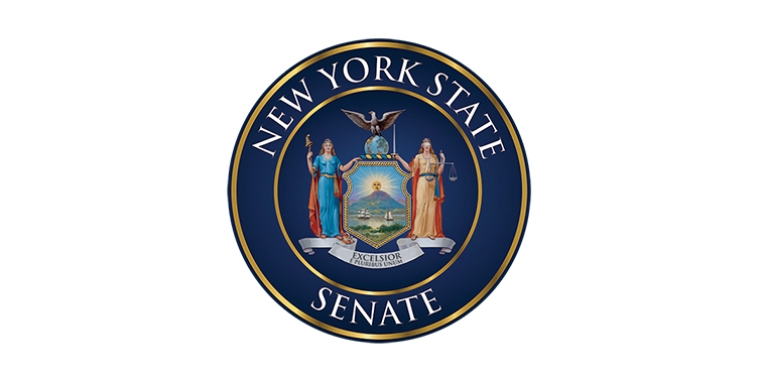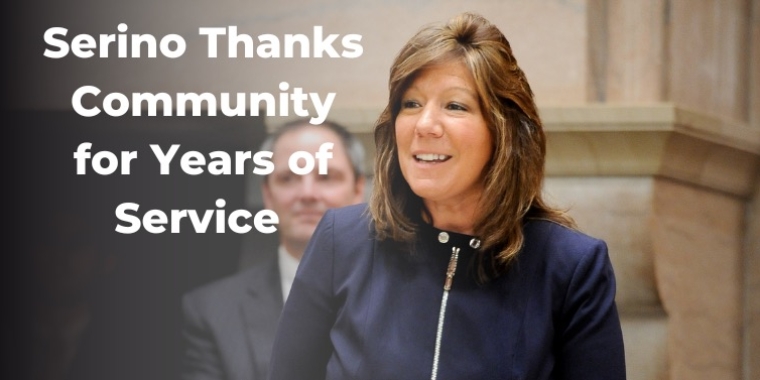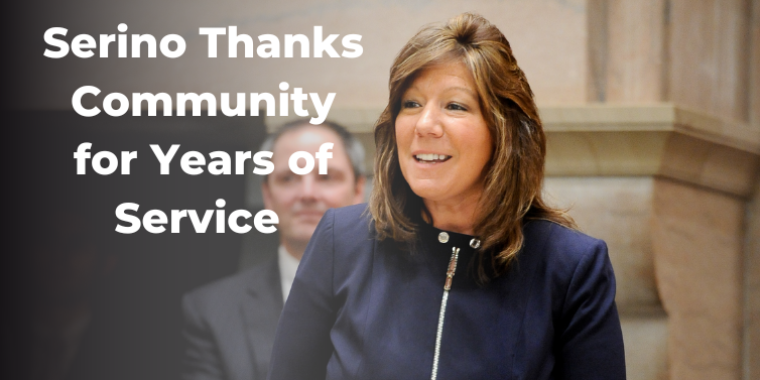AGING CHAIRS CALL ON STATE LEADERS TO ‘STEP UP FOR SENIORS’ Request Additional Budget Funding for Senior Services
February 7, 2017
-
ISSUE:
- Senior Resources
-
COMMITTEE:
- Aging

ALBANY, NY—Joined by aging advocates representing thousands of seniors from across New York State and a bi-partisan group of lawmakers from both the Senate and the Assembly, Senator Sue Serino (R, C, I—Hyde Park) and Assemblywoman Donna Lupardo (D—Binghamton) came together today to call on legislative leaders to make New York’s seniors a priority in this year’s state budget.
“The numbers don’t lie. We are on the brink of an unprecedented ‘age wave’ here in New York,” said Senator Serino. “If we continue to turn a blind eye and underfund the resources that play a critical role in helping our seniors to age in place—at home in our communities—make no mistake, we will pay a hefty price down the line. Making the growing population of seniors a priority in this year’s budget is good for our families, it’s good for our economy and it will play a critical role in keeping our state ahead of the curve for generations.”
Assemblywoman Lupardo said, "The growing population of older New Yorkers should get everyone's attention. We need to ensure that adequate services are in place for those who want to remain in their homes for as long as possible; providing critical services for those in need. We also need to acknowledge that seniors want to stay actively engaged in their communities for as long as possible. Aging services and programs need to be prioritized in this year's budget.”
Here in New York, the aging population has experienced a steady annual increase while other groups, like those under 18, have declined—making it home to the third largest senior population in the country. However, while the aging population grows, in this year’s proposed Executive Budget, the State Office for the Aging (SOFA) is facing the most drastic cut of any agency, with its budget being lowered by almost 5%.
While the Executive may argue that the amount of funding dedicated to aging-related services in this year’s budget proposal remains flat, the fact of the matter is that the claim is only true because of the diversion of various funding streams being used to prop it up.
For example, this year’s Executive Budget Proposal claims to allocate $30,054,000 to fund ‘community services for the elderly’ (CSE)—programs that provide critical services like meal delivery, transportation, and in-home care that can be tailored to fit the unique needs of local communities. That number is an increase of $1,121,000 over last year’s enacted budget. On its face, its looks like a win for seniors, however that money comes with strings attached.
CSE funding is subject to a local match and in previous budgets a provision has been included to exempt 25% of the county’s share on any new funding. Moving that money from the transportation line in the state budget to the CSE line automatically subjects it to that local match. Further, this year’s proposal removes that 25% county share exemption, in effect shifting additional costs to cash-strapped local governments. As a result, many communities may not be in a position to take advantage of available funding which will mean a significant loss of important services.
Currently, over 15,000 New Yorkers are on waitlists to receive these critical services in counties across the state—up from 9,700 just last year. At a time when there is a clear need, we should not be making it more difficult to access critical funding, but instead we should be adding significant dollars to meet the growing demand.
Another striking example of the discrepancy in proposed funding can be seen in the way the proposal seeks to address elder abuse. Elder abuse is a grossly underreported crime with advocates estimating that while almost 300,000 older adults are impacted nationwide each year, only 1 in 24 cases of abuse are ever reported to the authorities.
The Aging Chairs were heartened to see the Governor’s commitment to addressing the financial exploitation of seniors in his State of the State regional addresses. However, despite the language included in the proposal to strengthen the state’s efforts to protect senior’s financial health, the proposed budget cuts $700,000 in funding for elder abuse services. Because elder abuse is not limited to financial abuse, but also includes physical, sexual, and emotional abuse—as well as neglect—this funding has played a key role in protecting the safety of vulnerable older New Yorkers.
Attendees of today’s press conference argued that instead of shifting funding from various sources and budget lines to ensure to that funding for our seniors remains flat, the state should instead be solidifying its commitment to our seniors by notably increasing the funding available through NYSOFA for critical services.
Further, they argue that without express directives for funding to be geared toward senior services, the funding is at risk for eventually being redirected to fill other budgetary gaps.
Perhaps the most egregious example on this front pertains to federal Title XX funding—millions of dollars provided by the federal government often known as ‘Social Services Block Grants.’ This funding comes with some flexibility, and while much of it is allocated to counties and used in large part to fund Adult Protective and Domestic Violence Services, it has been used for decades in NYC as a means to fund senior centers.
The current budget proposal would require that a significant portion of the Title XX funding be redirected from adult-care to child-care services, in effect eliminating that crucial flexibility. The proposal could mean a $17 million cut to services and result in the closure of 65 senior centers across the city. That is about a third of the senior centers located throughout NYC—meaning a loss of access to key senior services including those vital to health and nutrition.
At today’s press conference, both Aging Chairs and the various advocates in attendance used the opportunity to implore the Executive to use his ‘30 Day Budget Amendments’ to provide additional funding to meet the needs of the growing senior population.
“I am thrilled to be here today with Senator Sue Serino, Assemblywoman Donna Lupardo and my colleagues in the Aging Services Network to advocate for additional funding for the NYS
Office for the Aging budget. I applaud the chairs for working in a bipartisan effort to advocate for funding which would send a clear message that our seniors matter. Older adults are the fastest growing segment of New York’s population and many rely on the services of the Aging Services Network to remain in the community. The Proposed Budget reduced funding in such critical service areas as elder abuse prevention and intervention services leaving New York’s seniors vulnerable. Today, we ask our state leaders to make restoring this funding a priority in this year’s budget,” Ann Marie Cook, President/CEO of Lifespan of Greater Rochester.
“I commend Senator Serino and Assemblywoman Lupardo for advocating for additional funding for Aging Services and programs. Area Agencies on Aging across the New York State continue to experience an increased need to assist older consumers and family caregivers. Additional funding will enable providers of community based services and supports to respond to this ever growing demand,” Michael Romano, Board President, Association on Aging in New York.
“We applaud and thank Senator Serino and Assemblywoman Lupardo for their leadership in coming together to advocate for older New Yorkers and family caregivers. Older people have an incredible amount of momentum and contribute to New York's economy and communities. We must ensure that New York's budgetary and legislative agenda match the growing population's needs and are invested in senior services,” Allison Nickerson, Executive Director, LiveOn NY.
AARP New York State Director Beth Finkel said, “Home-delivered meals, transportation to doctor’s appointments and assistance with normal daily activities help older New Yorkers age safely in their own homes, as nine out of 10 want. But because of insufficient funding, about 17,000 middle class New Yorkers who qualify are waiting for these services. In-home services are compassionate and cost-effective, supporting family caregivers and helping avoid unnecessary placements in far costlier, taxpayer-funded nursing homes. And the need keeps growing as our population ages. AARP urges a $25 million increase to ensure all qualifying New Yorkers receive these services, and we thank Senator Serino and Assemblywoman Lupardo for leading this fight for a humane and common sense investment.”
To join the cause, visit serino.nysenate.gov to fill out a petition.
-30-
Share this Article or Press Release
Newsroom
Go to NewsroomASHBY ANNOUNCES COMMITTEE ASSIGNMENTS
January 20, 2023

SERINO THANKS COMMUNITY FOR YEARS OF SERVICE
December 31, 2022

SERINO THANKS COMMUNITY FOR YEARS OF SERVICE
December 29, 2022
